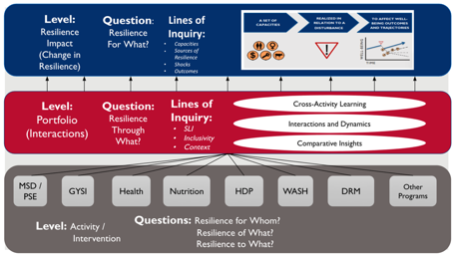To Fine-tune Integrated Resilience Programming, Let Learning Be Your Guide
Innovation and locally led approaches can go hand in hand with the development of learning agendas, even those—maybe especially those—associated with complex programming. In this blog, we tell the story of how the USAID Ethiopia Resilience Learning Activity (RLA) team used CLA principles and locally led approaches to develop a portfolio-level Resilience Learning Agenda that will guide Resilience Collective Action Platform in Year 2 of the project and beyond.
Resilience—the ability to manage through adversity and change, without compromising future well-being—is a key contributor to human health, happiness, and economic advancement. USAID Ethiopia’s resilience-building portfolio is among the largest and most complex in the world, meaning the Mission receives and manages an overwhelming quantity of data and information on resilience efforts and outcomes. To fine-tune resilience programming and ensure evidence guides decision-making in dynamic contexts, RLA implemented four key innovations to develop the learning agenda.
Innovation 1. Triangulating Information Needs
Learning agendas often start with a single theory of change, information source, or gathering process to elicit initial inputs. Given the complexity and breadth of topics covered in the resilience portfolio, we expanded our approach using three independent information gathering processes and then coordinated findings across them. We began by interviewing 18 USAID Ethiopia staff, resilience practitioners, and other stakeholders, focusing on where individuals, activities, and organizations felt strong in their knowledge base or where they sought CLA and resilience support. We then analyzed activity-level learning agendas alongside learning agendas at the Agency, Ethiopia-Mission, and intervention levels—encompassing a total of 276 learning questions. In parallel, we conducted an evidence gap analysis that laid out where there was strong, moderate, or weak evidence for assumed linkages related to resilience. Our team triangulated the findings to arrive at a high-level set of potential priority information needs.
Image - Participants Interact with Learning Space Themes and Provide Feedback at the Platform Launch Workshop
Innovation 2: Enabling Locally Led Design through our Collective Action Platform
Our RLA Collective Action Platform approach centers on ensuring local ownership, with local teams leading priority generation, identification, and implementation. To do this, we convened stakeholders to develop, refine, and prioritize their ideas and used facilitation practices that acknowledged existing power dynamics to draw out all participants’ perspectives. For the Learning Agenda design, we facilitated two workshops and supported intermediate groups to generate, prioritize, and finalize learning questions and propose communities of practice for startup. Collectively, this group of over 150 resilience community stakeholders consolidated the 276 learning questions to 25 top-priority areas of inquiry; then identified four questions that the local communities of practice will address over the coming year. Facilitating inclusive processes that support locally led prioritization, ownership, and research of learning activities is core to RLA’s approach to design and reflects locally led development best practices.
Innovation 3: Linking to Resilience Theory
USAID recommends that learning questions in a learning agenda clearly link to strategic objectives or goals. Given the breadth and extent of USAID Ethiopia’s resilience investments we used resilience theory to structure our learning agenda rather than tying it to a specific results framework. To consolidate and prioritize learning questions, we assessed alignment with a common resilience framework that looked at five aspects of resilience, corresponding to levels of programming and several lines of inquiry.
The final Learning Agenda includes 25 priority learning questions across the impact, portfolio, and intervention levels and recommends potential investigation methods for each. The community recommended 4 RLA-supported communities of practice that collectively respond to more than 10 learning questions. In each case, RLA is hiring local experts to work with cross-activity teams to conduct research and develop learning products.
Image – RLA’s Conceptual Framework for Resilience Measurement

Innovation 4: Learning agenda as a framework for CLA and collective action support
The RLA Learning Agenda not only guides broad inquiry and the design of learning events, but also has provided structure for teams to:
- Define communities of practice, who will work on specific urgent information needs on an ongoing basis.
- Develop a research agenda that contributes information and evidence around learning questions.
In the future, we intend that the Learning Agenda will also:
- Inform the procurement of grants under contract that program research connected to the Learning Agenda.
- Identify focal areas for data management and visualization.
- Structure our knowledge management system, including pages for the Learning Agenda and evidence relevant to learning questions, pages for communities of practice, and expert webinars on key topics.
- Illuminate areas for innovation around all aspects of resilience and resilience programming.
- Fine-tune a capacity strengthening approach around CLA and innovations.
Managing complexity and change is inherent both to organizational learning and resilience programming. In developing the RLA Learning Agenda, we’ve aimed to embrace the complexity of both, innovate with partners, and ultimately let learning be our guide.
About RLA: USAID Ethiopia’s Resilience Learning Activity (RLA) acts as the “learning sidecar” to the Mission’s investment in 20 resilience activities representing more than $1 billion investment in this resilience focal country. RLA supports USAID Ethiopia in uniting and galvanizing resilience learning in Ethiopia using USAID’s key resilience approaches and frameworks, and using a structured approach to connect learning levels, and to align with USAID’s higher level learning goals. In line with USAID’s draft updated resilience policy, RLA works with 20 diverse USAID-funded resilience projects that include food distribution, agriculture, market systems, education, livelihoods, peacebuilding, WASH, equity and social inclusion, and private sector-led economic growth. Partners LINC, Environmental Incentives, and JaRco implement RLA through three main pillars of Collective Action for Resilience; Collaborate, Learn, Adapt; Resilience Research; and Scaling Resilience Innovations. To tie these pillars together around a common set of priorities, RLA led the development of a platform-wide Learning Agenda, described above, that represents the current, shared learning interests of USAID and its resilience partners.







